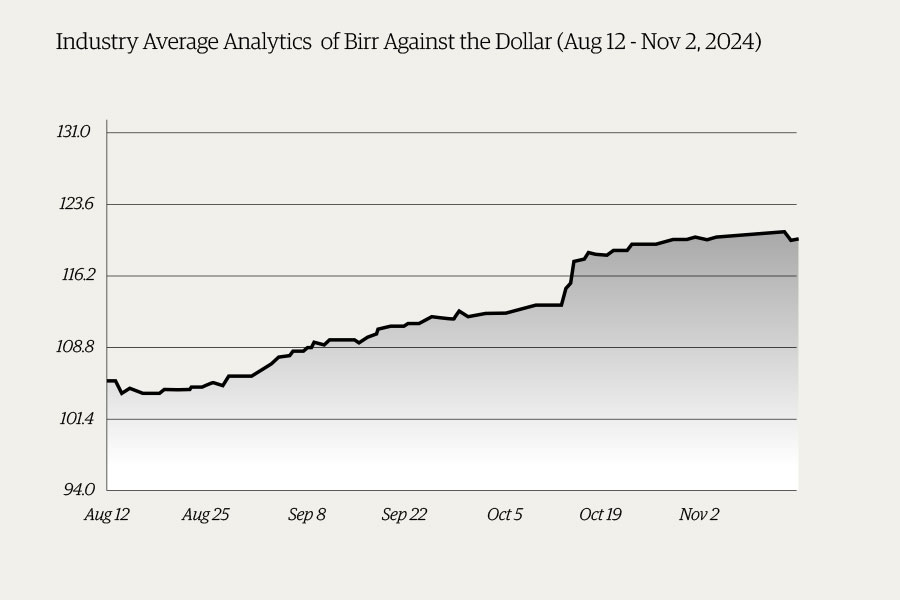
Fortune News | Sep 21,2019
A federal agency invitation to procure a large volume of edible oil found itself without a bidder. The lack of interest was attributed to the country’s foreign currency crunch, adding to a slew of challenges marking an ongoing economic struggle.
The Ethiopian Industrial Inputs Development Enterprise (EIIDE) had initially planned to procure 10 million litres of edible oil. However, despite nine companies purchasing the bid documents, none showed interest, leaving a question on the Enterprise executives' strategy to ensure the availability of essential commodities for Ethiopia's burgeoning population.
According to Mesfin Melese, the Enterprise's Procurement Coordinator, the executives are adjusting to the situation, reconsidering the option to lower the deposited payment orders and extending the delivery date. They hope these adjustments will incentivise companies to engage in the bidding process.
The foreign currency crunch has had a weighty impact on the bid response. Although the international market price of edible oil dropped by 35pc from an average of 1,023 dollars, the foreign exchange constraint has put the brakes on their plans to float an international bid, said Mesfin.
A state-owned entity established in 2015 with four billion Birr capital, the Enterprise buys and distributes essential consumer items such as cooking oil and sugar through its 83 outlets. Its operations are based on a revolving fund model, with profit margins kept under a ceiling of five percent on each commodity.
The volume for the latest procurement has been slashed by half from the initial plan after receiving information that the Ministry of Finance is processing a separate procurement for 20 million litres of edible oil. Mesfin disclosed that the oil is in the shipment process, with payment set to be settled after delivery using a deferred letter of credit.
However, this strategy does not seem to placate the concerns of local manufacturers. They express apprehension about the limited foreign currency allocation for crude palm oil import, mainly sourced from Ukraine, Djibouti, and South Africa.
A domestic company, Tena Oil Factory, is exploring an alternative strategy, according to Abraham Mekonnen, the factory’s manager. They plan to erect a plant to process raw inputs into crude oil, with an investment of 17.1 million dollars planned for this project in Qaliti and Dukem towns.
"We're moving towards self-sufficiency," Abraham told Fortune. "It'll give us some breathing space."
Abraham hopes this move will help his factory respond to the forex crunch’s impact on their operations.
Tena Oil was acquired by the business conglomerate SAMANU Group in 2015. However, its current production capacity is limited to 20pc of 375tn per month. The factory comprises an agricultural group tasked to develop arable lands, distribute seeds and facilitate market opportunities for farmers besides constructing a raw material plant.
Nonetheless, the issue extends beyond the companies directly involved in oil manufacturing. Public enterprises can purchase directly from factories, as the purpose-labelled luxury hotels and restaurants are not allowed the direct buy from the factory gates.
Edible oil is a significant part of Ethiopia's economic landscape. The Ethiopian Edible Oil Manufacturer Industries' Association, formed in 2018, has 600 members. Its Board Chairman, Mohammed Yusuf, blamed the insufficient forex allocation and poor crude oil usage for the crises in his industry.
The Associations estimate the country’s demand for edible oil up to one billion litres annually. The federal government forfeited 11 billion Br in revenues last year, following the waiver on essential commodities, according to Finance Minister Ahmed Shide.
Experts see as Ethiopia navigates these economic challenges, it is becoming increasingly evident that strategic changes in policy and industrial practice might be the keys to ensuring sustained growth and economic stability in the long run. Economists like Alemayehu Geda (PhD), who teaches at Addis Abeba University, emphasise the need for import substitution as a strategic approach to counter the foreign currency shortage.
“The benefit is beyond production,” said Alemayehu, highlighting the broader economic advantages of such a strategy.
The benefits would include a decrease in the country’s dependence on imports and an improvement in the economy’s resilience to external shocks, argued Alemayehu.
PUBLISHED ON
Jun 03,2023 [ VOL
24 , NO
1205]

Fortune News | Sep 21,2019

Radar | Jun 12,2021

Radar | Feb 06,2021

Money Market Watch | Nov 16,2024

Viewpoints | Dec 10,2018

Radar | Apr 10,2021

Agenda | Aug 09,2025

Radar | Sep 10,2022

Fortune News | Jan 30,2021

Fortune News | Nov 27,2018

Dec 22 , 2024 . By TIZITA SHEWAFERAW
Charged with transforming colossal state-owned enterprises into modern and competitiv...

Aug 18 , 2024 . By AKSAH ITALO
Although predictable Yonas Zerihun's job in the ride-hailing service is not immune to...

Jul 28 , 2024 . By TIZITA SHEWAFERAW
Unhabitual, perhaps too many, Samuel Gebreyohannes, 38, used to occasionally enjoy a couple of beers at breakfast. However, he recently swit...

Jul 13 , 2024 . By AKSAH ITALO
Investors who rely on tractors, trucks, and field vehicles for commuting, transporting commodities, and f...

Oct 25 , 2025
The regulatory machinery is on overdrive. In only two years, no fewer than 35 new pro...

Oct 18 , 2025
The political establishment, notably the ruling party and its top brass, has become p...

Oct 11 , 2025
Ladislas Farago, a roving Associated Press (AP) correspondent, arrived in Ethiopia in...

Oct 4 , 2025
Eyob Tekalegn (PhD) had been in the Governor's chair for only weeks when, on Septembe...